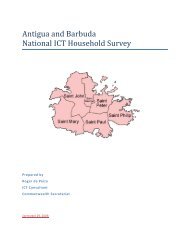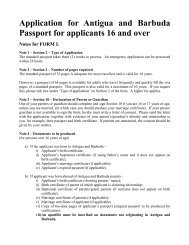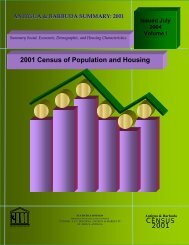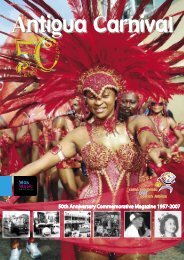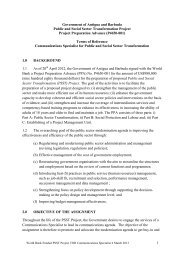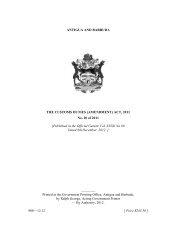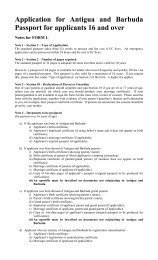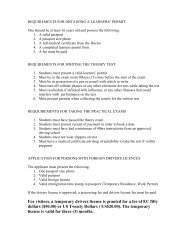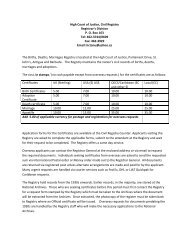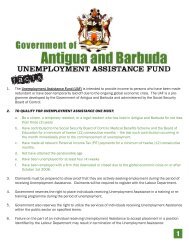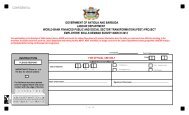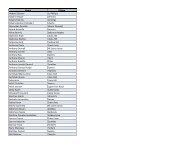BARBUDA'S FIRST CARIBANA - Antigua & Barbuda
BARBUDA'S FIRST CARIBANA - Antigua & Barbuda
BARBUDA'S FIRST CARIBANA - Antigua & Barbuda
You also want an ePaper? Increase the reach of your titles
YUMPU automatically turns print PDFs into web optimized ePapers that Google loves.
58<br />
Calypso<br />
Barry<br />
King Scorpion<br />
Mas<br />
Music<br />
F a n t a s y<br />
Edwards<br />
Valerie Harris-Pole<br />
Scorpion always considered his<br />
singing ability as a gift handed<br />
down genetically from his mother,<br />
Innocent Edwards, a former fixture<br />
on the Ebenezer Methodist Church<br />
Choir for many, many years.<br />
Naturally, he became a member<br />
of the church’s Junior Choir and<br />
was coached by the late Cleve<br />
Simmons.<br />
Calypso was always a love in<br />
Scorpion’s household where<br />
internal ‘competitions’ used to take<br />
place quite frequently between his<br />
older brother who was Lord Melody<br />
and himself the Mighty Sparrow.<br />
The first exposure and adventure<br />
into public calypso singing,<br />
however, was when Scorpion<br />
attended the University of the West<br />
Indies, Cave Hill Campus in the late<br />
1960’s where the Campus Carnival<br />
was a substitute for the other<br />
islands Carnivals that the students<br />
were missing.<br />
In 1971, his calypso name was the<br />
‘Snorer,’ as he was affectionately<br />
known after abandoning the<br />
moniker ‘Lord the Physics Too<br />
Hard’ when he won the Campus<br />
Calypso King title. With that win<br />
under his belt, Snorer became very<br />
popular, and with engagements<br />
in a few night clubs in Barbados,<br />
the most memorable of which<br />
profile<br />
was when he<br />
was chosen<br />
to be a part<br />
of the Mighty<br />
Sparrows’ Young<br />
Brigade revue for<br />
four nights. Snorer<br />
was definitely on his<br />
way to bigger things.<br />
That break gave him<br />
the confidence to pursue higher<br />
heights in the calypso world, and<br />
encouragement to stay with the<br />
art form coming from the Mighty<br />
Sparrow, and also from King Short<br />
Shirt, who came from <strong>Antigua</strong> to<br />
be a part of the grand finale at the<br />
National Stadium in Barbados, was<br />
all Snorer wanted to hear.<br />
Before returning home in 1975, he<br />
changed his name to “Scorpion,”<br />
a name he gave himself to fit his<br />
zodiac sign. Liming with some<br />
friends one night, someone dared<br />
him to be a guest performer at the<br />
popular “Maurice’s Night Club”<br />
which was situated on Market<br />
Street, on a show with Johnny<br />
Braff and the likes of Kaiso Joe,<br />
Franco and Lord Lee. Scorpion<br />
was so good that night when he<br />
performed, it was inevitable that the<br />
jitters of performing at home would<br />
disappear and the latest recruit for<br />
the Calypso Pepperpot, was found.<br />
That year he sang “Carey the<br />
Crazy man” and thereafter, “Oii<br />
yii,” “BamBaLayLay” and the<br />
unforgettable “Joke Dey Making”<br />
in 1978. Family<br />
commitment took<br />
Scorpion first to the UK for a few<br />
years where Calypso took a rest,<br />
and he became the resident singer<br />
at the Top Rank Suite in the resort<br />
city of Brighton for two years. In his<br />
personal collection are photos on<br />
stage with Prime Minister Margaret<br />
Thatcher when he performed at the<br />
Conservative Party Convention,<br />
and at her birthday function, which<br />
remain the highlights of that period.<br />
In 1982, Trinidad was the next<br />
stop for Scorpion, and for three<br />
years he was the lead singer in the<br />
then most popular Soca Band in<br />
Trinidad, “Shandileer.”<br />
<strong>Antigua</strong> was calling, and in 1986,<br />
the name Scorpion was back<br />
on the local landscape and was<br />
included on every list of finalists<br />
for the Monarch competition<br />
from 1987 until he chose not to<br />
compete in 2000. As President of<br />
a revitalized Calypso Association,<br />
he led a boycott of the Carnival<br />
Development Committee’s (CDC)<br />
run Calypso Monarch Competition,<br />
and organized a rival People’s<br />
Calypso King Competition.



